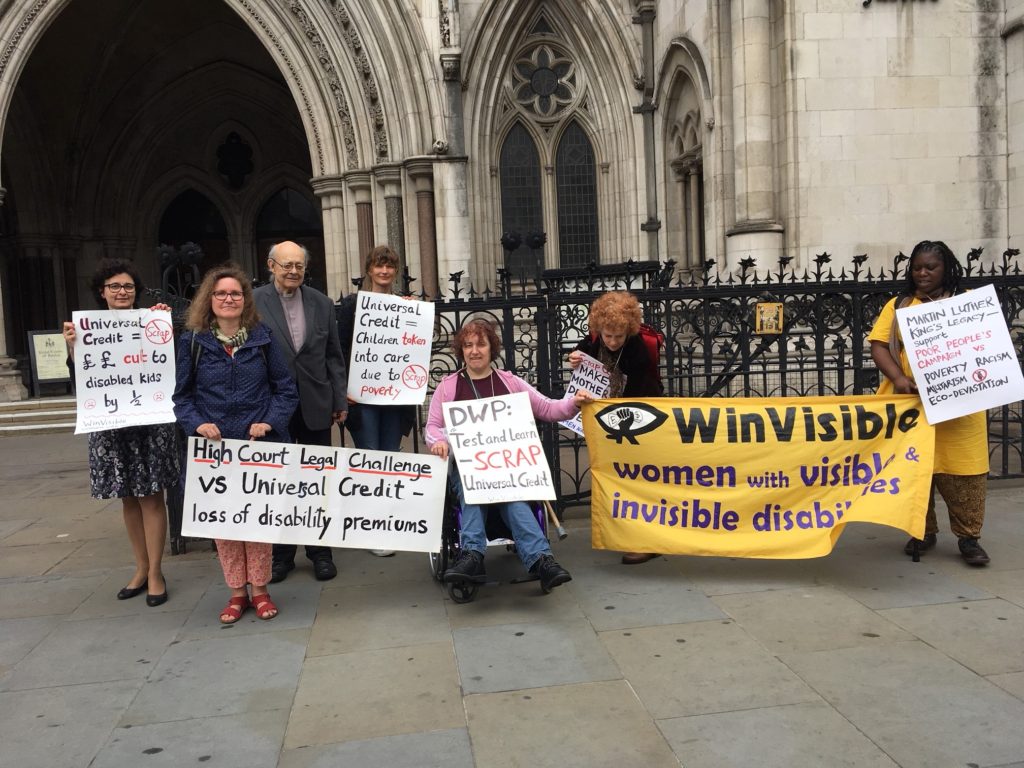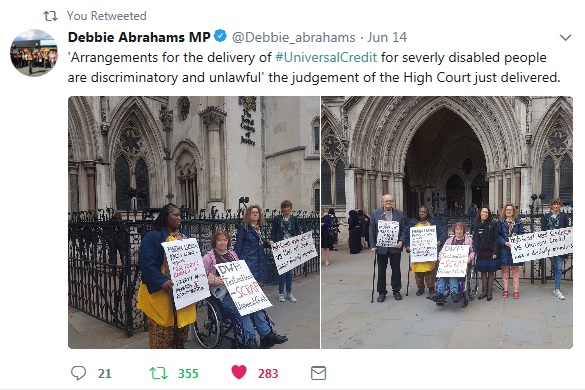High court rules that roll-out of Universal Credit is unlawfully discriminating against disabled people
The first legal challenge against Universal Credit has found that arrangements for its delivery unlawfully discriminate.

The first legal challenge against Universal Credit has found that arrangements for its delivery unlawfully discriminate. In a judgment handed down on Thursday 14 June 2018 Mr Justice Lewis ruled that the Secretary of State for Work and Pensions (SSWP) unlawfully discriminated against two severely disabled men, known as TP and AR, who both saw their benefits dramatically reduced when they moved Local Authority and were required to claim Universal Credit. Both had lost disability premiums, which do not exists under Universal credit, worth £178 per month.

Universal Credit does not include disability premiums and transitional protection to cover disabled people who currently receive Severe Disability Premium and Enhanced Disability Premium was only available for claimants who are transferred across to UC by the DWP as it is rolled out in their area. This process is called “managed migration”. Transitional protection was not available for people like TP and AR who ended up claiming UC because their circumstances changed – they moved to a different local authority.

It is worth noting that the claimants also tried to argue that the absence of an equivalent to SDP and EDP n Universal Credit is discriminatory. This challenge was unsuccessful. The judge concluded that: “it cannot be said that the decision to structure universal credit in the way that was done was manifestly without reasonable foundation. The measure reflects the conscious and deliberate assessment by the government of the appropriate balance between the competing interest groups. That assessment has been considered and approved by the legislative bodies. The claimants, and others, are seeking an allocation of resources to assist with their needs. They are not entitled to insist upon the continuation of the previous level of resources they received under a previous system particularly where that system is considered by government, and the legislature, to be unduly complex and not to achieve the appropriate aims”.
This just illustrates again how difficult it is to challenge discrimination in welfare policies, especially when they were subjected to Parliamentary scrutiny.
The government’s announcement
A week before the High Court judgment, Esther McVey made an announcement that changes will be made to ensure claimants who qualify for SDP and whose circumstances change will not be moved to UC until they qualify for transitional protection. It also promised back payments for those who lost out on transitional protection in the past. However, neither the announcement, nor the high court judgment reverse the loss of disability premiums under Universal Credit which still applies to new claimants.
Misleading reporting of the judgement
There was some confusion in reporting of the judgment. While in the court room the DWP barristers tried to get permission to appeal the judgement and argued that the DWP liable for lower costs to the claimants, members of the press who were not present began reporting that the claimants had lost their challenge. We can only assume that this information came from a DWP’s briefing. The case was brought on three grounds and two out of three were dismissed by the judge. However the failed attempt by the DWP to appeal against the ruling and the awarding of costs to the claimants is not consistent with an interpretation that the claimants “lost” the challenge.


Comments by Leigh Day
Commenting on the case, Tessa Gregory a partner at Leigh Day, who represented both claimants, said: “Whilst we welcome the Government’s commitment to ensuring that no one in our client’s position will now be moved onto Universal Credit until top up payments are in place, it comes too late as it cannot make up for the months of suffering and grinding poverty our clients and many others like them have already had to endure. We call upon Esther McVey to compensate our clients and all those affected without any further delay, and urge her to focus on fixing Universal Credit rather than wasting more public funds appealing this court decision… “The government needs to halt the rollout and completely overhaul the system to meet peoples’ needs, not condemn them to destitution. If this doesn’t happen further legal challenges will inevitably follow.”
For more information see:
The judgement is available at http://www.bailii.org/ew/cases/EWHC/Admin/2018/1474.html